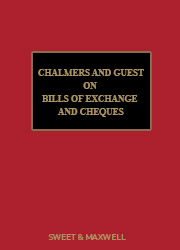
Chalmers & Guest on Bills of Exchange 19th Edition
|
Book $805.00 RRP |
Date: 30/04/2024 Code: 9780414067233 Sweet & Maxwell, UNITED KINGDOM |

Chalmers & Guest on Bills of Exchange 19th Edition
Price: $805.00
|
Browse:
Available Formats
| Format | Title | Date | Code | Price | |
|---|---|---|---|---|---|
| Book | Chalmers & Guest on Bills of Exchange 19th Edition | 30/04/2024 | 9780414067233 | $805.00 |
Add to cart

Chalmers & Guest on Bills of Exchange 19th Edition
Price: $805.00
|
| eBook - ProView | Bills of Exchange and Cheques 19th Edition eBook | 30/04/2024 | 9780414104334 | $805.00 |
Add to cart

Bills of Exchange and Cheques 19th Edition eBook
Price: $805.00
|
| Book+eBook | Bills of Exchange and Cheques 19th Edition Print + ProView | 30/04/2024 | 9780414104327 | $1,046.00 |
Add to cart

Bills of Exchange and Cheques 19th Edition Print + ProView
Price: $1,046.00
|
Description
Chalmers & Guest provides the definitive guide to the Bills of Exchange Act 1882 and the Cheques Act 1957, and offers legal practitioners comprehensive guidance to the law and practice relating to bills of exchange, cheques and promissory notes.
- Offers comprehensive guidance on the law and practice relating to bills of exchange, cheques and promissory notes
- Provides a section by section commentary to the primary legislation, the Bills of Exchange Act 1882 and the Cheques Act 1957
- Explains in detail what provisions the legislation contains, and provides opinion and guidance on how to comply
- Presents a selection of precedents to assist the reader in communications as well as court proceedings
- Illustrates common situations where problems may arise, and works through the legal consequence
- Covers legal capacity for entering into a payment contract
- Addresses consideration, and how the rules governing it diverge from contract law
- Considers how bills may be transferred from one person to anther
- Sets out the general duties of the holder, including the necessary steps to fix the maturity of the instrument
- Identifies the liabilities of the parties
- Looks at discharge of a bill, including circumstances where payment is insufficient to discharge the bill
- Details the law governing lost, destroyed or split bills as well as crossed cheques
- Examines the applicable law where parties are based in different jurisdictions, and conflict of laws
- Reflects the changes introduced by Small Business, enterprise and Employment Act 2015 on bills of exchange and cheques: in particular the changes concerning electronic payment of bills
Table of Contents
BILLS OF EXCHANGE ACT 1882
PART I
PRELIMINARY
PART II
BILLS OF EXCHANGE
Form and Interpretation
3. Bills of Exchange defined
4. Inland and foreign bills
5. Effect where different parties to bill are the same person
6. Address to drawee
7. Certainty required as to payee
8. What bills are negotiable
9. Sum payable
10. Bill payable on demand
11. Bill payable at a future time
12. Omission of date in payable after date
13. Ante-dating and post-dating
14. Computation of time of payment
15. Case of need
16. Optional stipulations by drawer of indorser
17. Definition and requisites of acceptance
18. Time of acceptance
19. General and qualified acceptances
20. Inchoate instruments
21. Delivery
Capacity and Authority of Parties
22. Capacity of parties
23. Signature essential to liability
24. Forged or unauthorised signature
25. Procuration signatures
26. Person signing as agent or in a representative capacity
The Consideration for a Bill
27. Value and holder for value
28. Accommodation bill or party
29. Holder in due course
30. Presumption of value and good faith
Negotiation of Bills
31. Negotiation of Bill
32. Requisites of a valid indorsement
33. Conditional indorsement
34. Indorsement in blank and special indorsement
35. Restrictive indorsement
36. Negotiation of overdue or dishonoured bill
37. Negotiation of bill to party already liable thereon
38. Rights of the holder
General Duties of the Holder
39. When presentment for acceptance is necessary
40. Time for presenting bill payable after sight
41. Rules as to presentment for acceptance, and excuses for non-presentment
42. Non-acceptance
43. Dishonour by non-acceptance, and its consequences
44. Duties as to qualified acceptances
45. Rules as to presentment for payment
46. Excuses for delay or non-presentment for payment
<div productdetail-backtotop"="" style="margin: 10px 0px 0px; padding: 0px; color: rgb(64, 64, 64); font-family: Arial, Helvetica, sans-serif; font-size: 11px;">back to top
 Banking & Financial Services
Banking & Financial Services